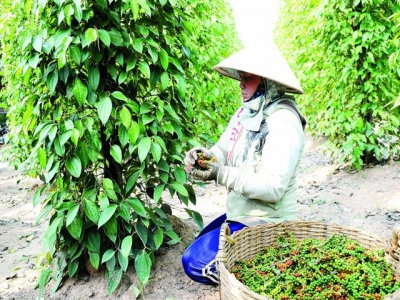Vietnam eyes EU trade deal for hotter pepper exports

The EU-Vietnam Free Trade Agreement (EVFTA) will offer Vietnamese pepper businesses opportunities to expand export markets, increase competitiveness and attract foreign investment.
Facilitating sustainable cultivation of pepper
Potential export market
According to the Agency of Foreign Trade under the Ministry of Industry and Trade, EU countries have committed to abolishing tariffs on pepper product coded HS 09.04 as soon as EVFTA takes effect. This will greatly help Vietnamese businesses increase exports, especially processed products that bore a tax rate of 5-9 percent, to the EU.
Tran Cong Thang, Deputy Director of the Institute of Policy and Strategy for Agriculture and Rural Development (IPSARD) under the Ministry of Agriculture and Rural Development said the EU’s growing demand for pepper imports and EVFTA-related tariff cuts would provide opportunities for Vietnam to increase pepper exports to the EU.
Previously, pepper exports to the EU had to meet standards of specific member countries, but after EVFTA comes into effect, they will have to satisfy the uniform standards of the bloc. Vietnam will likely have development opportunities when EU investors move their processing plants to Vietnam to benefit from low material and labor costs.
Technical barriers
However, Vietnam’s pepper industry will face many challenges under the trade pact. Nguyen Thi Thu Trang, Director of WTO Integration Center under the Vietnam Chamber of Commerce and Industry (VCCI) said it would not be easy to achieve preferential rules of origin, especially of agricultural products. FTA commitments are not export licenses or visas for commodities, and they will not eliminate requirements on food safety, origin traceability, technical barriers in trade (TBT), and Sanitary and Phytosanitary Measures (SPS), she said.
IPSARD Deputy Director Tran Cong Thang said Vietnam’s pepper exports are facing increasing technical barriers in importing countries, and Vietnam has been warned repeatedly of pesticide residues in its pepper products. In addition, Vietnamese pepper still faces risks of origin traceability, as businesses in the country still have to import pepper from a third country for export production, which accounts for about 10 percent of Vietnam’s pepper export value.
Vietnam’s pepper industry has not been able to take advantage of EVFTA opportunities due to its substandard seed quality, harvest and post-harvest preservation, and small-scale production.
Thang recommended that the state build and develop production areas in accordance with global and Vietnamese good agricultural practices, and facilitate the development of clean processing facilities and product diversification so Vietnamese pepper businesses can penetrate more deeply into the global pepper supply chain. Businesses should promote joint ventures and take the initiative in market and consumer research, he said. Farmers should follow good agricultural practices in the use of input materials and work closely with enterprises to meet the market’s needs, Thang said.
Vietnam accounts for 27 percent of the EU’s pepper import value, ranking first among pepper exporters to this market.
Có thể bạn quan tâm
 Efforts made to preserve ancient shan tuyet tea trees in Ha Giang
Efforts made to preserve ancient shan tuyet tea trees in Ha Giang Northern Ha Giang province’s Hoang Su Phi district, the hub of shan tuyet tea trees, which has been recognised as part of the Ancient Tree Heritage of Vietnam
 Vietnam Jan-Sept coffee exports likely fell 12% y/y - govt
Vietnam Jan-Sept coffee exports likely fell 12% y/y - govt Vietnam’s coffee exports in the first nine months of the year likely fell 12% from a year earlier to 1.27 million tonnes, while rice exports likely rose 4.5%
 Kiên Giang increases rice output
Kiên Giang increases rice output The Cửu Long (Mekong) Delta province of Kiên Giang, the country’s largest rice producer, is expected to produce 4.3 million tonnes of paddy this year